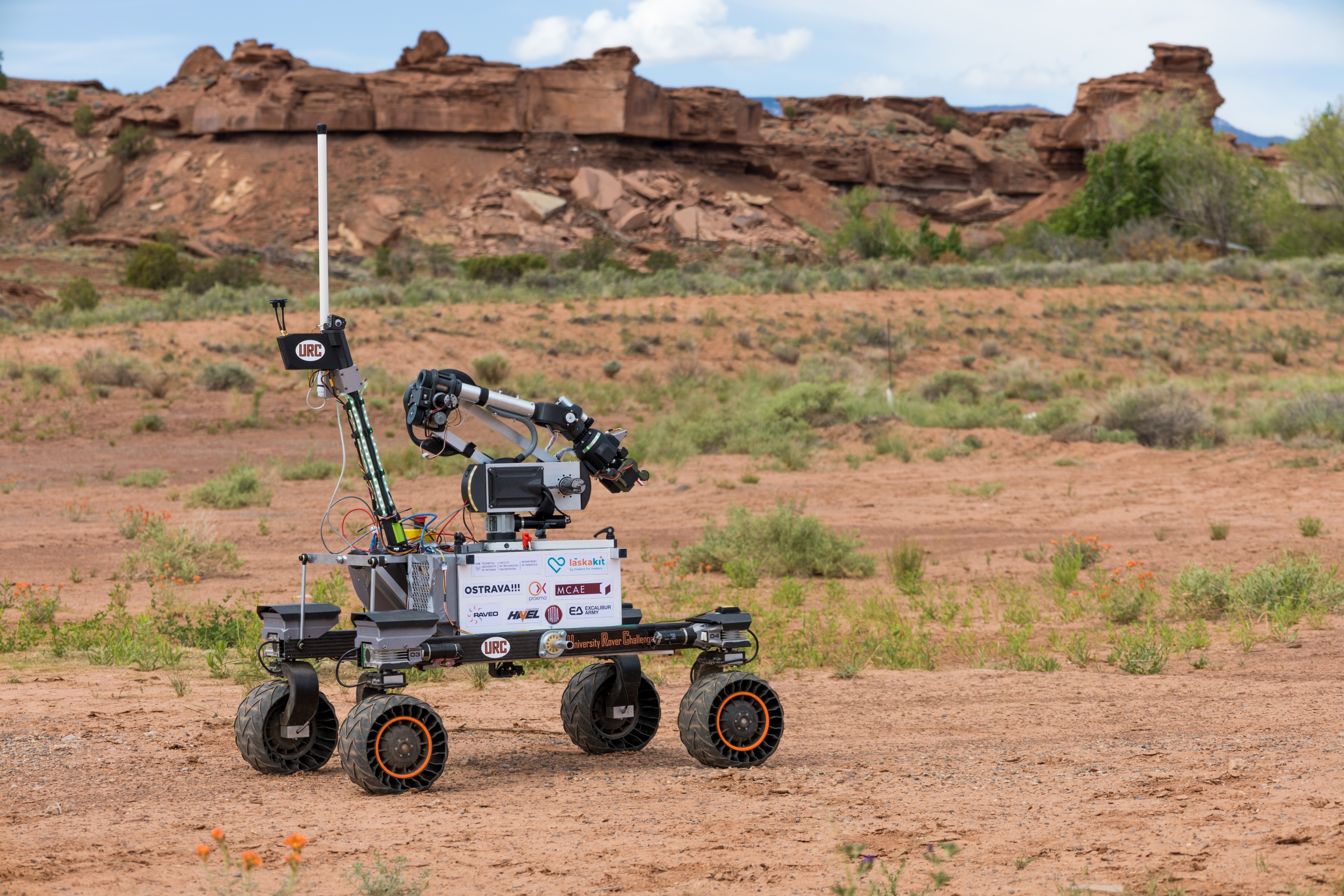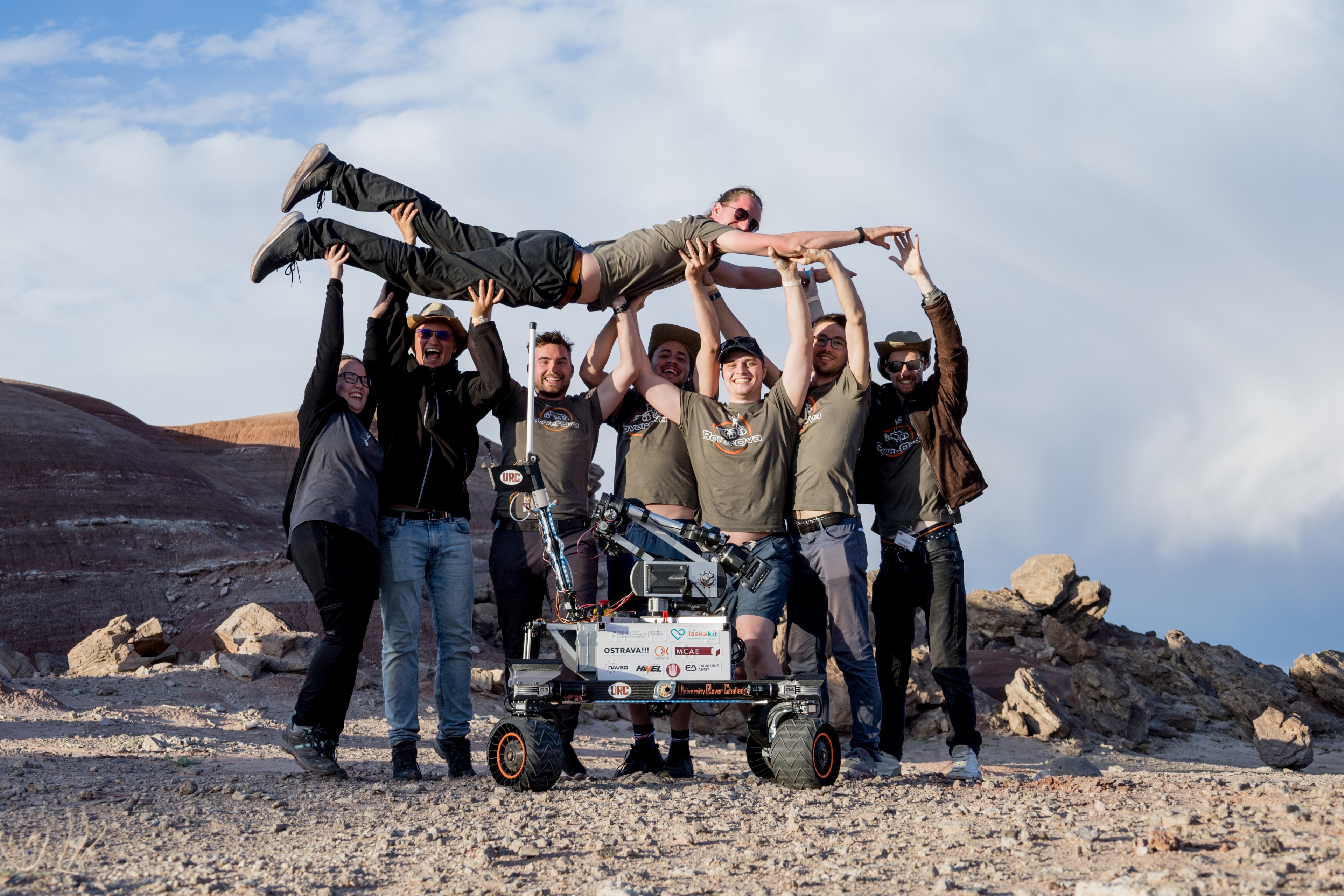The American experience of the RoverOva team: words of success and disillusionment
The first out of one hundred and twenty
The RoverOva team, consisting mainly of students from the Department of Robotics at the Faculty of Mechanical Engineering, is the only university team in the Czech Republic involved in the construction of a rover-like mobile robot. In Europe and worldwide, this discipline is quite popular at technical universities - for example, one hundred and twenty teams from all over the world competed in the competition in Utah, USA. Only thirty-seven teams made it through the rigorous registration process, including the Czech team, which scored right from the start with its preparatory documentation. The jury judged it to be the best. "This is where our experience showed. We did our best, we didn't underestimate anything and we are especially proud of the video," says the captain of the team, Adam Boleslavský, whose squad - one of the smallest - left all the other one hundred and nineteen behind.
Rover or bomb?
Encouraged by their initial success, the students packed their bags and flew to the United States at the end of May. The Rover, which would have cost hundreds of thousands to fly alone, was distributed among the seven suitcases the team members had with them. During the design phase, they had to calculate not only the size but also the weight. "Each suitcase had a standard twenty-three kilogram limit. We even carried one that resembled a weapons case - it was quite bizarre, but nonetheless necessary. We had to somehow transport the longest part of the rover," explains Adam. As his teammate Jan Bém added, they did not avoid strict checks and proving that they were not carrying bomb-making materials in suitcases full of cables and parts. Thanks to careful preparation, everything worked out well in the end, and apart from a few damaged suitcases, the boys arrived in the US safely and the rover was unharmed.
The rover has seen a few design modifications compared to last year in order to improve it again. "We lightened the robot's fuselage to add more sensors, improved its arms with effectors, and still fit within the allowed weight of fifty kilos," the students describe.

Competition in the middle of nowhere
The four-day competition took place in the middle of the Utah desert, with the nearest village fifteen kilometres away. The Czech team travelled from an even greater distance of sixty kilometres each day. "We drove through a beautiful national park for most of the way, but the last five kilometres were really desert, so the Americans put it right into the rules that we had to get an off-road vehicle," says Jan Bém. In the desert, the team completed four missions that tested its ability to drive the rover remotely using cameras or to program an autonomous sequence. The students navigated the robot from the control centre, which was unusually far from where the tasks were carried out. "Thanks to the antenna, we had no problem with signals. But we had to adapt the transmission frequencies to the rules of the local legislation," explains the team captain Adam Boleslavský.
Not every stone is the same
And how did they do in the missions? The students failed only the autonomous driving due to a fault in the electronics, the other three missions were above expectations. This is despite the fact that the rover lost a wheel in one navigation mission. "The rover was tasked with finding a rock, or fossil, and delivering it to the astronaut. But the astronaut was behind an overhang, so we couldn't see him through the cameras. We didn't find him until two minutes before the time limit was up, so we sent the rover towards him at full speed, not noticing the large pothole and leaving one wheel in it. On top of that we picked up the wrong rock," says Adam, while his teammate adds in the same breath: "But a lot of teams took it straight over the overhang and completely destroyed the rover. Only one team finished it. So we still did well," laughs Honza, who managed to repair the rover overnight using only spare, makeshift parts from the nearest hardware store.

Next time we'd better go to Turkey
Although the boys rate their performance in the American competition as successful, they probably don't see themselves participating again. There are several reasons for this - apart from the high financial demands, the students mention the disconnection from the other participants. "It was very impersonal, isolated. We were only given instructions on what time to arrive where, and that was it. We didn't see the other teams at all, we didn't even have the opportunity to work in the same place on the rovers," the captain evaluates. So next time the team will prefer to go to Turkey, where last year they experienced a much friendlier, more welcoming attitude and made many international friendships. This year, despite a successful qualification, they cannot go there. They don't have the money or the people. They are glad for the US experience, but Turkey or Poland wins for them. "The prestige is not everything," concludes RoverOva team member Honza Bém.